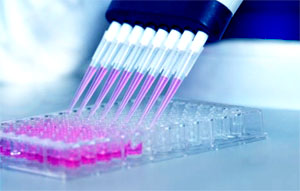


‘ELISA’ is abbreviated as Enzyme-linked Immunosorbent Assay. It is discovered in 1971 by two Swedish scientist, Eva Engvall and Peter Perlman. This technique is named as ELISA because it involves the use of an immunosorbent, an absorbing material specific for one of the component of the reaction i.e the antigen or antibody. The test involves a biochemical technique used mainly in immunology detection of an antibody and antigen in the test sample. ELISA Kit can be categorized into different types such as direct, indirect, sandwich and competitive. The test may be used in various applications depending on the biological question, available binder and detection methodology.
In the era of specialized technologies, the ELISA Kit for the lab research has emerged as a highly efficient & reliable technique running at the top due to its versatile applications in various field of application including medicinal and scientific research. The ELISA test uses component of the immune system such as IgG or IgM antibodies and chemicals for the detection of immune responses in the body towards foreign objects. The test mainly involves an antibody or an antigen (immunogenic molecules). The ELISA test can be applied to detect proteins and antibodies related to an allergen, viral antigen, hormones, bacterial antigen and infectious diseases agent. In clinical practice, ELISA is to be considered as the troy horse.
Here are some of the advantages of the ELISA technique
1. ELISA technique could be used for quantitative and qualitative analysis.
2. The test is quick with easy procedure steps for the specific assay.
3. The technique is safe as compared RIA
4. The assay requires microplate reader or ELISA reader based on colourimeter principal which is comparatively economical.
5. The technique shows flexibility as more than one type can be applied to measure the same analyte.
6. The ELISA has high sensitivity and specificity achieved by the coating of the plate with a high-affinity antibody. This technique is simple to perform as compared to other more complicated assays. The technique is the most commercially available tool.
7. The test is strongly specific due to the selective of antigen or the antibody. Very selective towards the site of recognition (antigen-antibody site).
8. Nowadays, miniaturization of ELISA with microdevices has made possible to test small volume of samples with much efficiency and reproducibility.
9. ELISA with micro and nanofabrication strategies and integration of the assay with lab-on-chip (LOC) and lab-on-compact-disk (LOCD) devices provides detection at micro and nano level.
10. To achieve identification of existing different proteins, peptides, antibodies and other bio compounds different ELISA method types provides an additional advantage to this technique.
11. The test of ELISA is easier and straightforward to perform as compared to the existing common laboratory techniques.
12. ELISA has promising great potential from point-of-care (POC) due to its cost-effectiveness.
13. Multiplexing version of ELISA provides convince of detecting multiple parameters simultaneously in the same sample.
14. Useful in detecting diseases outbreak, can also be used in toxicology as a rapid presumptive screen for certain class of drugs. It is also utilized to diagnose several cancers (bladder cancer).
15. Useful in the detection of microbes in foodstuff example salmonella.
16. New techniques of ELISA uses flurogen, electro-chemiluminescent and quantitative PCR is also known as q PCR-ELOSA abbreviated as quantitative polymerase chain reaction-enzyme-linked oligosorbent assay
17. This result of immunoassay making a record in remote/rural areas and subsequently analyzed by digital technologies or in laboratories via mass data transfer, Finally, the digital era has opened new opportunity for ELISA.
The recent invention in ELISA techniques has made its applications advantageous in many fields of biotechnology, scientific research, clinical diagnosis, plant pathology, diseases conditions, food technology to detect food allergens, drug screening, physician laboratories, medical professional and others across the world. Contact lab research products distributors in Delhi at support@clementiabiotech.com for more information.
